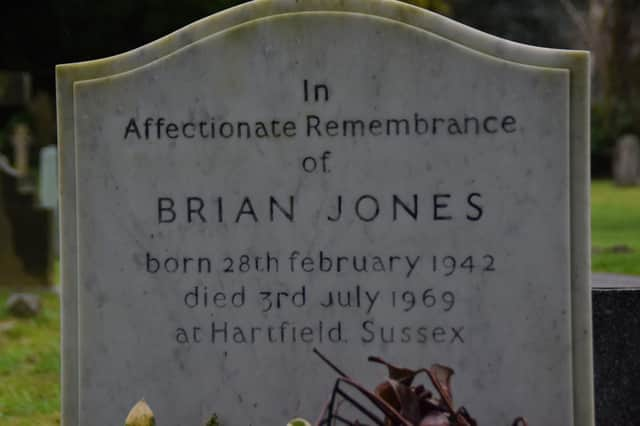Compelling tale of the tragic Rolling Stone who died in Sussex


If you’re a Rolling Stones fan, you’ll find it very easy to talk about the astonishing genius of Brian Jones. The trouble is that you’ll very quickly feel obliged to add that, yes, you are perfectly aware that Jones was also a brute capable of intense cruelty and darkness.
Nick Broomfield’s superb new documentary The Stones and Brian Jones doesn’t aim to square that particular circle. No one ever will. But where his film really succeeds is in painting a portrait of a man of incredible complexity and sadness, of remarkable talent and tragedy, the founder of the greatest rock ‘n’ roll band in the world who was dead at the age of 27.
Advertisement
Hide AdAdvertisement
Hide AdMaybe the greatest irony was that he died – drowned – at Cotchford Farm, Hartfield, East Sussex, a property once previously owned by A A Milne: from Winnie the Pooh childhood innocence to the prototype of all rock ‘n’ roll demises in just a few short generations. But for all his faults and all his failings – and arguably Broomfield could have made more of them – if you stand at Jones’s graveside in his hometown of Cheltenham (yes, in the end, the rebel went home), it’s impossible not to feel anything but intense sadness. Broomfield offers a sympathetic – though far from uncritical – portrait of the most difficult of men, and it is the most fascinating portrait too, drawing on priceless first-hand accounts from the various girlfriends who were mesmerised by him (particularly between the sheets) to the school mates who clearly still hold him in deep affection.
Jones was the musician who set up the Stones at the age of 19. His greatest tragedy perhaps is that he set them up with the man, Mick Jagger, who was so obviously destined to emerge as their true leader. Early accounts talk of a young Brian who was open, friendly, gentlemanly (kissing a girlfriend’s father’s hand), softly spoken and kind. In the early days of the Stones, 60 per cent of the fan mail was directed at Jones; the young Jagger and the young Keith Richards were fascinated by him. He was the heart of the Rolling Stones. And yet, as Broomfield points out, most people today have barely heard of him.
It's lovely in this film to hear former Stones bassist Bill Wyman, 86 years young, speak with such genuine awe of Jones’ contribution to the band, his brilliance on Paint It Black for instance, his instinctive genius as a musician. But already Jones was the rebel, expelled from two schools, thrown out by a father who couldn’t abide the “degraded” music he was playing. Compelling footage shows the total chaos Stones concerts regularly descended into – the kind of chaos which would soon be Jones’ personal fate.
Jagger was the natural frontman; Jones wasn’t. Jagger and Richards churned out the songs; Jones didn’t. And so he was sidelined in his own band. And so the demons took over. Zouzou, one of his many girlfriends, recalls him “doing every stupid thing you can imagine” and then crying at night. As the Stones’ late drummer Charlie Watts says, Jones just didn’t have the mental strength for the drink and drugs he consumed. Probably no one did. The Stones weren’t doing the music Jones wanted them to do; his health was generally poor; and paranoia took over.
Advertisement
Hide AdAdvertisement
Hide AdJones’s sacking from the band was inevitable. He was far too unreliable to tour with. And just three weeks later he was dead, drowned in his East Sussex pool. His death has been the subject of endless speculation ever since, endless conspiracies. Fascinating to hear Wyman say that Jones drowned, as simple as that. Broomfield’s captures it all eloquently and elegantly, a tale of rock ‘n’ roll wastage which came with its own inevitability. Easy to be wise after the event, but as Keith Richards says, you just couldn’t ever have imagined Brian Jones at the age of 70.
To an extent, it’s all a tale we know already, but Broomfield gets the right people to tell it – and delivers the most touching of epilogues with the letter, discovered so many years later, in which Jones’ father, so stern and disapproving, just before Brian’s death, admits he was a “very poor and intolerant father (….) quite out of my depth.” Sadness indeed. But had that relationship with his father been better, had Brian Jones been happier, would we have had the Stones? Who knows. Probably not as we know them. Genius and tragedy so often go hand in hand, and they certainly did with Brian Jones. Broomfield has delivered a masterly, beautiful, compelling film.